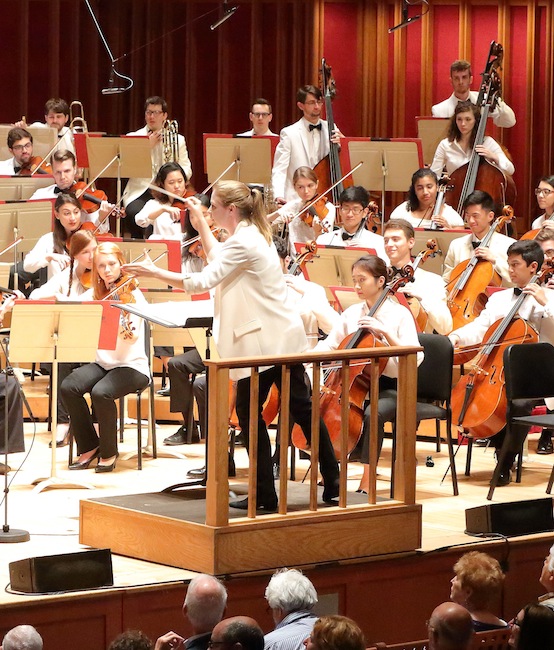Clear-eyed yet hopeful, Gandolfi’s “In America” receives a rousing debut at Tanglewood

Gemma New conducted the Tanglewood Music Center Orchestra in the world premiere of Michael Gandolfi’s “In America” Monday night at Ozawa Hall. Photo: Hilary Scott
Michael Gandolfi’s In America received a rousing world premiere Monday night at Ozawa Hall, with conductor Gemma New leading the Tanglewood Music Center Orchestra and a roster of TMC vocal fellows. Gandolfi, a longtime TMC faculty member, wrote the work as part of this summer’s Leonard Bernstein Centennial Celebration at Tanglewood.
In America calls for six singers and a huge orchestra. Like Bernstein’s American bicentennial offering, Songfest, Gandolfi draws on an array of texts from a cross-section of notable American authors and public figures. These include Mark Twain, H.L. Mencken, Cesar Chavez, Robert Kennedy, and Emma Gonzalez.
The result is a thoughtful, 30-minute meditation of what it means to live in and wrestle with the social, cultural, and political contradictions that define the country.
That’s a tall order, but not one outside Gandolfi’s grasp. Songfest offers critique as well as celebratory gestures. Gandolfi’s focus is darker and a bit more cynical, but it’s not without hope: we’ve endured tough times before, his program note states, and can fight – and grow – through them again.
As befits such a piece, In America is decidedly musically eclectic. It opens with what Gandolfi describes as a gloss on a television theme song, replete with tolling bells, sweeping brass melodies, and a pulsing string accompaniment. This gives way to a hymn-like section after which the voices enter, singing texts by Twain and Mencken.
The musical character in this first part (“Whither the Phrase?”) is generally bright and diatonic, with some intimations of jazz cropping up in the setting of banal expressions (“In America We Coin a Phrase”) and Minimalist riffs accompanying excerpts from Bobby Kennedy’s speech in Indianapolis following Martin Luther King Jr.’s assassination.
Near the end, in Walt Whitman’s “Democratic Vistas,” the scoring thins out and the music turns somber.
In America’s second part, “Illumination,” then ventures into darker places. Its four settings – excerpts from Chavez’s “Lessons of Dr. Martin Luther King, Jr.,” Brenda Hillman’s “A Short Rhyme for Amiri Baraka,” Alexander Posey’s “A Vision of Rest,” and Claude McKay’s “America” – focus on death and responses to it.
Gandolfi’s writing is correspondingly turbulent and unsettled. The solo bass-led Chavez setting builds to a climax of agitated, rhythmically dissonant instrumental textures before boiling over into “A Short Rhyme.” In this movement, the alto soloist lets loose, spitting out Hillman’s words syllabically while the orchestra, led by a drum kit, unloads slashing interjections.
Things calm down for “A Vision of Rest,” in which harp and strings provide a discreet accompaniment to first soprano’s lullaby-like solo. But the mood becomes ominous again in “America,” with dissonant orchestral punctuations echoing the second soprano’s dark-hued melody.
The short, concluding third part, “Voices of Strength,” sets words by Rosa Parks, Harvey Milk, and Gonzalez. It opens with a whoosh of string harmonics that resolve into spare, Sibelian string textures. When the singers enter, Gandolfi stacks the texts so they heard as a simultaneous jumble, before the orchestra reprises the opening theme of Part One. A wordless, accompanied vocalise brings In America to a reflective conclusion.
The strongest moments are the poetic ones in Part Two, which don’t shy away from grittiness. Parts of its outer thirds share these qualities, too: “In America We Coin a Phrase” is breezy and playful, the finale’s vocalise gives the work an appropriately devotional ending, and Gandolfi’s cyclical structuring of the whole lends it an aptly epic air.
At the same time, Gandolfi’s music for prose settings are, generally, less comfortable and memorable than his poetic ones; at times, as with the Kennedy excerpt, the music borders on the trivial.
Still, there is a heartfelt sincerity to the piece and, with its mix of crowd-pleasing and musically clever moments, plenty to admire. Monday’s audience certainly thought so, rewarding the performers and composer with a hearty ovation.
The evening’s impressive soloists were Elena Villalón, Olivia Cosio, Katherine Beck, Chance Jonas-O’Toole, Edward Vogel, and William Socolof. A few technical issues in Part Two resulted in moments of shrillness by the amplified singers. Even so, the ensemble delivered their parts with fire – the female trio especially so – and security.
TMC conducting fellow New presided over the massed forces with assurance. Her leadership was the picture of confidence: boldly energized, smartly paced, every cue in place. The TMCO responded in kind, with playing of tight ensemble and electrifying color.
Before the Gandolfi, another TMC conducting fellow, Yu An Chang, led the TMCO in a burnished, muscular performance of Leonard Bernstein’s Facsimile. Originally a ballet that dealt with themes of human relationships, loneliness, and boredom, this 1947 “choreographic essay” owes some stylistic debts to Copland, even as it conveys Bernstein’s burgeoning individuality.
Chang’s reading began tentatively, but built in character and energy as the work’s narrative unfolded, especially during the score’s vigorous competition scenes. Adam Rothenberg made dazzling work of Facsimile’s extroverted piano solos.
The night’s second half featured a refulgent performance of Copland’s Symphony No. 3. Stefan Asbury drew a reading of the first movement that married moments of silken delicacy with climaxes of iron-fisted intensity; the scherzo was incisive and animated.
In the third movement, the delicate, stratospheric violin writing at the start was spot-on. And the finale, with its interpolation of the Fanfare for the Common Man, was highlighted by playing of brilliant energy and a concluding peroration that was at once cathartic and heroic.
Posted in Performances




Posted Jul 26, 2018 at 11:46 am by Ritchie Tiemann
The Rosa Parks alleged quote used is not original with her. Wrongly attributed quotes are a plague.